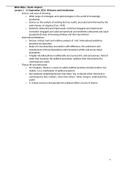IRRG Slides + Book chapters
Lecture 1 – 12 September 2022: Welcome and Introduction
- Science and ways of knowing
o Wide range of ontologies and epistemologies in the world of knowledge
production
o Science as the analysis of existing facts by realist, preceded and informed by the
wish-dreams of utopians (Carr 1939)
o Epistemic (detached and impersonal), technical (engaged and impersonal),
normative (engaged and value-perspectival) and Aesthetics (detached and value-
perspectival) ways of knowing whiskey and the international
- International Relations
o Serious, critical, hard and ruthless analysis of ‘real’ international problems,
preceded by aspiration
o Study of cross-boundary encounters with difference, the subversion and
maintenance of those boundaries and transaction within and across those
boundaries
o A highly interdisciplinary traditionally very Eurocentric and exclusionary, field of
study that examines the political and power relations that characterize the
contemporary world
- Theory (IR and otherwise)
o For Utopians, theory is a norm to which political practices should conform. For
realists, it is a codification of political practices
o Non-optional simplifying devices that allow ‘you to decide which historical or
contemporary facts matters, more than others” when trying to understand the
world
o A ‘critical means to denaturalize the political effects of uses of history
1
,Lecture 2 – 14 September 2022: Realism, Power Politics and Westsplaining’
- Historical roots of realist thought
o Thucydides, Machiavelli, Hobbes, Rousseau among key raison d’etat thinkers
o Defining throughline concepts of statism, survival and self-help up to today
o Morality, values, justice unimportant to analysis and conduct of IR
o State as a moral force that permits domestic ethical community to emerge
- Realists vs idealists
o Several seminal classical realist works published in inter-war/post-WW2 period
o 20th C. Classical realists often contrasted themselves with idealists/utopians
o Pessimistic view of human nature/lust for power
o Carr dismissed League of Nations as a ‘hopeless dream’
o Morgenthau identified three basic patterns of struggle for power and stressed
importance of leaders maintaining balance of power
- Structural Realism/Neorealism
o International Structure > Human Nature
o Structure characterized by organizing principles, differentiation of units and
distribution of capabilities (Waltz)
o Mearsheimer’s 5 neorealist assumptions:
Anarchic system
Militarily capable states
Uncertainty of intentions
Motivated by survival
Instrumentally rational states
2
, o Mearsheimer’s 3 patterns of behaviour:
States fear each other
States prioritize their own survival
States prioritize relative gains (offensive/defensive realism differs on how
much)
o Causes of war/facilitators of stability
Polarity
Unipolar/bipolar/multipolar
Balanced or imbalanced power distribution
Some disagreement between offensive/defensive realists
Shifts in power
Possibility of war increases with rising challenger
Security dilemma
Unresolvable uncertainty regarding intentions of potential
adversaries
- Mearsheimer says that states always need to get more power, because balance will never
happen
- Neoclassical realism
o Retain many core assumptions of neorealism, but dispute the value of its
parsimony and criticize its ‘status quo’ bias
o Open up the ‘black box’ of the state to complement systemic explanations
o Focus on factors such as leaders’ perceptions (eg of rivals, of the balance of
power), domestic politics, domestic state capacity, state institutions as intervening
variables
o Invokes Morgenthat with focus on status quo/revisionist states
- What do realist study?
o Alliance formation
o Tensions stemming from relative gains maximization
o Changes in weaponry and polarity
o Rising great powers
o The limited utility of international institutions
- Criticism of realism
o State-centrism can be criticized on empirical and normative grounds
o Oversells the significance of military power, and holds an overly narrow view of
what constitutes latent power
o Structural focus obscures the experiences and challenges of other groups and
organizations
o Realist assumptions (self-help, international ‘state of war’ become self-fulfilling
prophecies)
o Reproduces Western exceptionalism, minimizes (or ignores) smaller states’ calls
for self determination.
Chapter 5: Realism
• Realism has been the
dominant theory of world
3




